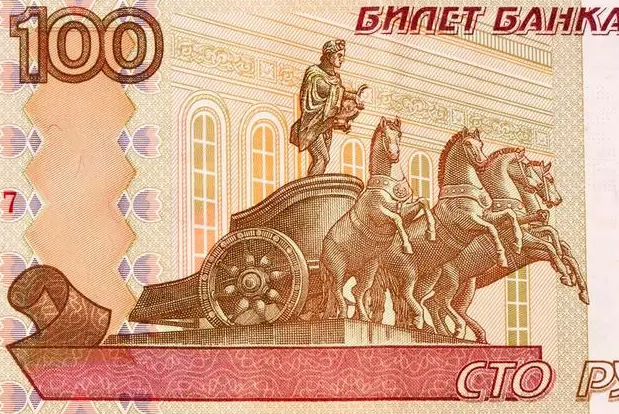Ruble Collapse: An Opportune Moment!
Advertisements
In an alarming turn of events, the Central Bank of Russia implemented yet another interest rate hike in October, raising the pivotal rate from 19% to a staggering 21%. This decision, however, proved to be an insufficient remedy against the rampant inflation and the continuing devaluation of the Russian ruble. The gravity of the situation is evident, as inflation rates in Russia are forecasted by the Ministry of Economic Development to reach a shocking 13.4% this year. This figure is particularly sobering given that Russia possesses abundant energy resources and should theoretically be able to mitigate energy price inflation. The sustained high inflation rate suggests that prices for essential goods—ranging from food to everyday items—have surged dramatically, highlighting the distressing economic conditions affecting the daily lives of Russian citizens.
The reality of the ruble's devaluation is indisputable, with the currency undergoing severe losses on foreign exchange markets. In a swift decline, the ruble's value plummeted against the dollar, initially dipping below 114, then maintaining a precarious position above the 110 mark—a level not seen since March 2022. This rapid deterioration in currency value raised alarm bells, compelling the Central Bank to halt the purchase of foreign currency on domestic markets from November 28 until the end of the year, a move viewed as a last-ditch effort to preserve dwindling foreign exchange reserves. The potential for resuming such purchases in the upcoming year will depend heavily on future economic circumstances.
It's crucial to understand that Russia operates under a regime of foreign exchange controls, meaning that the official exchange rates may not accurately reflect the true market conditions. Should Russia ease these controls, analysts predict a further drop in the ruble’s value—potentially down to 200 or even 300 against the dollar. As history has shown, periods of crisis have often led to drastic currency depreciation.

In the initial stages of the conflict that sparked geopolitical tensions, Western nations imposed a range of sanctions against Russia, affecting both trade and finance. The ruble's value took a dramatic hit, plummeting to rates around 150. Nevertheless, following Russia's implementation of countermeasures, the currency experienced a temporary resurgence, recovering to about 47.75 against the dollar by June 2022. Although it subsequently faced some devaluation, the ruble had not breached the psychologically significant 100 mark until recently when it appeared to collapse under renewed pressure.
The catalyst behind the ruble's swift depreciation this time around is closely linked to a new wave of sanctions from the United States. Recently, the U.S. Treasury announced sanctions targeting significant Russian entities, including Gazprombank—previously one of the last major financial institutions untouched by sanctions. Gazprombank is pivotal in financing Russia’s natural gas industry, and imposing restrictions on its operations signals a tightening of the economic noose around Russia's economy.
While some might espouse the misguided notion that conflict leads to financial advantage, the reality for Russia's domestic economy is that it is teetering on the edge of collapse. Having historically relied on earnings from oil and gas exports to support their economy, recent sanctions have stymied Russia's ability to sell energy to European markets. Although trade with allied nations has been increased to offset some losses, it has not been enough to fully compensate for the economic shortfall. Additionally, the costs associated with sustained military engagement are astronomical, placing further strain on national finances.
With revenues dwindling and expenditures soaring, Russia has turned to drawing down its fiscal reserves and resorting to "printing money" to survive. However, as every economist knows, reliance on old reserves cannot sustain an economy indefinitely, and excessive money printing breeds hyperinflation and currency devaluation. These adverse economic dynamics accumulate over time, leading to a tipping point that, once reached, erupts into a broader economic crisis.
Adding to the tumult, the United States has intensified financial sanctions against Russia at this critical juncture. Faced with internal economic difficulties and external pressures, the ruble's collapse becomes an expected outcome. The Central Bank’s decision to suspend currency purchases is a desperate strategy; allowing the ruble to freely depreciate would likely trigger a massive sell-off of the currency, further decimating the already scant foreign reserves. In the face of such a scenario, Russia would find itself paralyzed, incapable of procuring essential imported goods necessary for maintaining domestic stability.
Moreover, the act of exchanging rubles for foreign currencies exacerbates the downward spiral, propelling the currency further into a perilous inflationary trajectory—creating a potentially lethal spiral of devaluation. While halting foreign currency purchases may spark skepticism about the true state of the Russian economy, it remains a necessary recourse, a pathway of last resort.
Ultimately, successful wartime endeavors hinge on a nation's comprehensive capabilities, with economic factors providing the essential foundation for sustaining extensive military operations. Should the economy crumble, the most battle-ready troops will quickly diminish in strength. Historical precedents underline this crucial principle: logistics and supply lines were historically decisive factors in the outcomes of conflicts.
While the Russian military may presently exhibit strength on the battlefield, the continuous drainage of resources amidst an ailing economy puts these advantages at risk. As the severity of sanctions escalates and the domestic economy nears its limits, President Putin's negotiating power diminishes. Delaying resolution of the conflict may lead to increasingly unfavorable terms in any future negotiations.
Leave a Reply